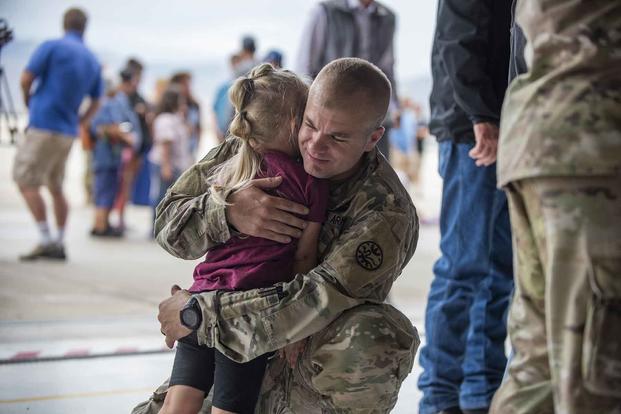A young noncommissioned officer has a promising career in the Army. He's a combat arms soldier who loves to run around in the woods with machine guns. He earned his Ranger tab and an Expert Infantryman Badge, has one of the highest fitness scores in his unit, and sports several achievement medals on his ribbon rack.
He is about as decorated and ready for war as a soldier can be at his rank without any combat experience.
But a near constant string of rotations and trainings, and now a year-long mission in Europe, mean he has been home for only a few months cumulatively in his short four-year career and is in the middle of marriage counseling.
Read Next: In Wake of Fatal Black Hawk Crash, Renewed Scrutiny of the Helicopter's Safety Record
"It has been a huge struggle, especially as [we're] trying to start a family," said the NCO who spoke to Military.com on the condition of anonymity because he was not authorized to talk to the press. "I'm not sure what's going to happen with my marriage, but there is a huge chance I'm leaving the Army."
Military.com spoke to more than a dozen soldiers about a rapid cadence of missions and training schedules packed to the point of bursting. They described how the service's frantic pace to gear up for war is stretching units and pushing families to the breaking point.
"We're as high or higher with the [operations tempo]," Sergeant Major of the Army Michael Grinston told Military.com, referring to the frequency with which soldiers are away from home compared to the peak of the Global War on Terrorism.
That time away from home made more sense to soldiers a decade ago when the Army was fighting a war on two fronts and slowly building up a presence in Africa. The burden of war is expected and sometimes welcomed with glee, especially from front-line units. But that rapid pace has gotten only more extreme. On paper, soldiers seemingly have a similar, if not higher, rate of deployment now as during the height of the Global War on Terror.
This month, the Army has some 120,000 soldiers deployed abroad, according to internal service data reviewed by Military.com.
For comparison, the entire Department of Defense, encompassing all military branches, had an all-time high of 187,900 troops in Afghanistan and Iraq when those conflicts peaked in 2008, according to congressional data. But that number was short-lived and dipped fast after the conflict in Iraq died down and again after the passing of the surge in Afghanistan.
The 2008 data also refers to a time when the Army was roughly 70,000 soldiers larger. Right now, a smaller Army is taking on a mission load loosely equivalent to the entire military in the late 2000s and early 2010s.
"The average citizen doesn't know how stressful this is on our families. I think it has been an incredible strain on our soldiers and our families," Grinston said. "We have a 100% obligation to be ready for the worst-case scenario, so we have to go to the CTC [combat training center]. The American people would never forgive us if we sent soldiers to Europe that weren't as trained as the best we could get."
All of the soldiers who spoke to Military.com knew they would likely be deployed overseas and expected long hours doing training when at home. The service's recruiting pitch has had that type of responsibility baked in for years.
The soldiers said they're ready for war and are more than happy to go to combat, but did not expect this much time away from home during what is effectively peacetime.
There is a small contingent of soldiers in Syria and Iraq, mostly the Ohio National Guard's 37th Infantry Brigade Combat Team. The New Jersey National Guard's 44th Infantry Brigade Combat Team is in the midst of training to take over Ohio's mission. Additional troops are in reserve and providing logistical support in Kuwait. There are even some 300 Indiana National Guard soldiers in Kosovo, a peacekeeping mission that predates 9/11.
But those deployments are small and radically different from what the Army has faced when engaged in full-on wars in Afghanistan and Iraq. That doesn't mean troops aren't still engaging in combat.
In 2019, the New Jersey National Guard's 1st Squadron, 102nd Cavalry Regiment, got into a frantic gunfight with al-Shabaab in Somalia. Most direct combat, however, is delegated to special operations forces.The Army's 3rd Special Forces Group got into a high-profile firefight in Niger in 2017 in which four soldiers were killed.
In a vacuum, the specific missions taking so many troops away from home are necessary, according to service leaders. Soldiers need to spend time in the field to train, they need to attend specific schools for different credentials and promotion, CTC rotations are critical to getting a unit combat-ready, and the current mission in Europe bolstering NATO's front line is seen by the Biden administration as key to deterring Russian President Vladimir Putin from extending his warpath beyond Ukraine's borders. But having all those elements tasked to the Army at once is raising concerns with senior leaders over potential burnout.
Deployments are usually scheduled two to three years in advance, one Army official with direct knowledge of the behind-the-scenes process told Military.com, but changes to the missions are a constant moving target for Army planners. That deployment schedule also doesn't account for time out in the field and other obligations that often take soldiers away from home.
"Just one less thing, just a little more breathing room would be extremely helpful," one Army lieutenant currently deployed to Poland told Military.com.
-- Steve Beynon can be reached at Steve.Beynon@military.com. Follow him on Twitter @StevenBeynon.
Related: 'Cheated and Guilty': The Struggle for Troops Who Missed Out on Combat













